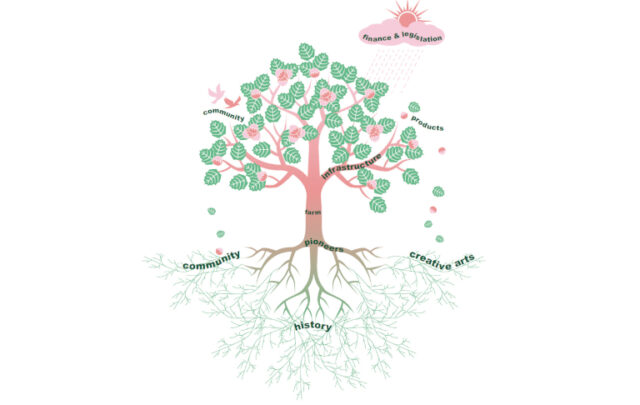If making the degrowth case was like baking a cake, disproving the plausibility of green growth would be the equivalent of turning the oven on. Decoupling is only “a myth” or “a fantasy,” some would say, a notorious fallacy that requires as much attention as the confabulations of Flat Earthers. And yet, faith in decoupling is strengthening in environmental agendas all around the world, including the OECD, European Commission, World Bank, UNEP, as well as the Sustainable Development Goals where it even has its own target.
War of the de- words
The concepts of “degrowth” and “decoupling” are actually the same age. Décroissance (the French ancestor of degrowth) was born at a colloquium in 2002 and decoupling first adopted by the OECD in 2001. Since then, the squabbling has been incessant. Decouplers tout efficiency as a recipe for more goods and services at a lower environmental cost while degrowthers plead for sufficiency, arguing that fewer commodities is the only road to sustainability.
Reading over government reports today, it would seem that decoupling has won. But has it really? In a recent report (Decoupling debunked: Evidence and arguments against green growth), my co-authors and I have enquired to determine if the scientific foundations behind the decoupling hypothesis were robust. After reviewing the bulk of the latest empirical studies, our finding is clear: the decoupling literature is a haystack without a needle.
The validity of the green growth discourse relies on the assumption of an absolute, permanent, global, large and fast enough decoupling of Gross Domestic Product from all critical environmental pressures. Problem is: there is no empirical evidence for such a decoupling having ever happened. This is the case for materials, energy, water, greenhouse gases, land, water pollutants, and biodiversity loss, for which decoupling is either only relative, and/or observed only temporarily, and/or only locally. In most cases, decoupling is relative. When absolute decoupling occurs, it is observed only during rather short periods of time, concerning only certain resources or forms of impacts, for specific locations, and with minuscule rates of mitigation.
Of course we can bicker about numbers. Perhaps the camera was faulty and the Loch Ness monster is still somewhere to be found. And after all, the lack of empirical support does not suffice to fully dismiss the possibility of decoupling, which some argue could well happen in the future with the right set of policies.
Seven reason why decoupling won’t happen
But that is wishful thinking. In the report, we offer seven reasons to be sceptical about the occurrence of decoupling in the near future:
- Rising energy expenditures. When extracting a resource, cheaper options are generally used first, the extraction of remaining stocks then becoming a more resource- and energy-intensive process resulting in a rising total environmental degradation per unit of resource extracted.
- Rebound effects. Efficiency improvements are often partly or totally compensated by a reallocation of saved resources and money to either more of the same consumption (e.g. using a fuel-efficient car more often), or other impactful consumptions (e.g. buying plane tickets for remote holidays with the money saved from fuel economies). It can also generate structural changes in the economy that induce higher consumption (e.g. more fuel-efficient cars reinforce a car-based transport system at the expense of greener alternatives, such as public transport and cycling).
- Problem shifting. Technological solutions to one environmental problem can create new ones and/or exacerbate others. For example, the production of private electric vehicles puts pressure on lithium, copper, and cobalt resources; the production of biofuel raises concerns about land use; while nuclear power generation produces nuclear risks and logistic concerns regarding nuclear waste disposal.
- The underestimated impact of services. The service economy can only exist on top of the material economy, not instead of it. Services have a significant footprint that often adds to, rather than substitute, that of goods.
- Limited potential of recycling. Recycling rates are currently low and only slowly increasing, and recycling processes generally still require a significant amount of energy and virgin raw materials. Most importantly, recycling is strictly limited in its ability to provide resources for an expanding material economy.
- Insufficient and inappropriate technological change. Technological progress is not targeting the factors of production that matter for ecological sustainability and not leading to the type of innovations that reduce environmental pressures; it is not disruptive enough as it fails to displace other undesirable technologies; and it is not in itself fast enough to enable a sufficient decoupling.
- Cost shifting. What has been observed and termed as decoupling in some local cases was generally only apparent decoupling resulting mostly from an externalisation of environmental impact from high-consumption to low-consumption countries enabled by international trade. Accounting on a footprint basis reveals a much less optimistic picture and casts further doubt on the possibility of a consistent decoupling in the future.
Decoupling is a waste of time
As Herman Daly already argued forty years ago, the bet we are facing is similar to Pascal’s Wager. Either we hope that somehow these seven problems will solve themselves, continue growth-as-usual and risk environmental breakdown; or we acknowledge that decoupling is likely to fail with irreversible consequences, follow a precautionary principle approach, and start directly reducing the problematic forms of production and consumption.
Besides, framing these issues as a decoupling challenge is problematic. A weird mix of a Cartesian desire to emancipate humans from nature, coupled with an escape-forward logic. It is not innocent that the term “decoupling” itself comes from the field of electrical engineering. If problems with humans are solved forward with transhumanism, green growth promises a transnatural form of ecological sustainability. Even if it were theoretically possible (which is not), decoupling would still not be a healthy objective.
Instead of a divorce between society and nature, one should rather pursue couple’s therapy to reconcile one with the other, namely figuring out how to ensure the provision of what is required for the “good life” following a principle of prudent stewardship and non-exploitation. The issues we find ourselves in can be solved backward by acting on the elements that created the problem in the first place, namely the choice of countries to pursue economic growth at all social ecological costs.
Farewell to green growth
Decoupling is an extraordinary claim without extraordinary evidence, and the burden of proof is now on the green growth side of the debate. To all of those who want to argue for the possibility of decoupling, I give a challenge: provide adequate and convincing demonstrations against each and all of the above-mentioned arguments. Until then, the decoupling hypothesis should be treated as what it currently is: a statistical figment, an act of pure belief with little relevance for both theory building and policy making.
It is the end of the battle of the de-words, and decoupling has lost. Now that the oven is warm, what degrowth thinkers should focus on is finding ingredients (policies) and recipes (transition scenarios) as to make sure the societal project of degrowth results in a delicious cake.
This blog post is based on a report recently published, titled “Decoupling debunked: Evidence and arguments against green growth”.























